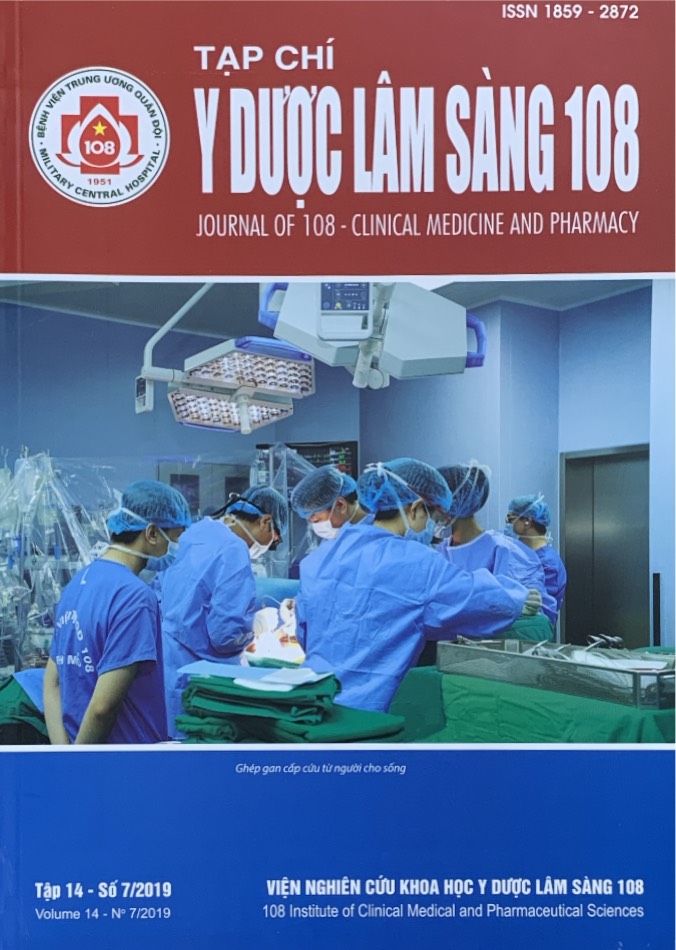Effectiveness and safety of antithymocyte globulins used in induction therapy in kidney transplant recipients in 108 Military Central Hospital
Main Article Content
Keywords
Abstract
Objective: To describe our experiences with a group of renal transplant patients treated with rabbit antithymocyte globulin (ATG) as induction therapy at transplant to reduce the incidence of acute rejection and prevent delayed allograft function at 108 Military Central Hospital. Subject and method: Retrospective study of 8 kidney recipients of deceased-donor or living-donor kidney transplants received rabbit antithymocyte globulin (rATG) from January 2018 to October 2019. Indications and ATG induction were recommended by the North American Organ Transplant Association. The dosage was 1mg/kg in 5 consecutive days from the date of transplant. Prophylactic immunosuppressive therapy included prograf, cellcept and prednisolon. Clinical characteristics, efficacy and safety of ATG, kidney function, and complications evaluated after transplantation until the present time (October 2019). Result: 8 kidney transplant recipients (6 from living donors, 2 from brain death donors) were treated with ATG. The mean age was 42.9 ± 8.6 years (Male/female: 7/1). 6 patients were on dialysis, 1 patient was on peritoneal dialysis, one ESRD patient was on conservative treatment. The average time for dialysis was 28.3 (2 - 120) months. Causes of renal failure were due to glomerulonephritis (7/8 patients, 87.5%). ABO blood type-incompatible kidney transplantation was on 4 pairs (50%), 5 - 6 HLA mismatches 4 pairs (50%). The median follow-up period was 16.6 (1.6 - 25.5) months. No patients had an acute rejection episode. Currently, all recipients had good allograft function (8 patients, 100%). 1 patient had sepsis caused by E. coli and pneumonia, recovered stable with specific treatment. Other complications were mild and self-recover. Conclusion: Considering the study design limitations, we observed that antithymocyte globulins used in induction therapy in kidney transplant recipients had effectiveness and safety in reducing the incidence of acute rejection and preventing delayed allograft function. Complications of infection had rarely been only seen in 1 patient, recovered after antibiotic therapy.
Article Details
References
2. Lê Nguyên Vũ, Hoàng Long, Nguyễn Tiến Quyết (2013) Đánh giá qui trình và kết quả ghép thận từ người cho chết não tại Bệnh viện Việt Đức. Tạp chí Nghiên cứu Y học, 83(3), tr. 80-87.
3. Federico C, Fernando M, Marta P, Javier R (2013) Clinical experience with thymoglobulin and antithymocyte globulin-fresenius as induction therapy in renal transplant patients: A retrospective study. Exp Clin Transplant. 11(5): 418-422.
4. Brennan DC, Daller JA, Lake KD, Cibrik D, Del Castillo D (2006) Thymoglobulin induction study group. Rabbit antithymocyte globulin versus basiliximab in renal transplantation. N Engl J Med 355(19): 1967-1977.
5. Gavela Martínez E, Sancho Calabuig A, Escudero Quesada V et al (2008) Induction treatment with low-dose thymoglobulin or basiliximab inrenal transplants from older donors. Transplant Proc 40(9): 2900-2902.
6. Gaber AO, Matas AJ, Henry ML et al (2012) Antithymocyte globulin induction in living donor renal transplant recipients: Final report of the TAILOR registry. Transplantation 94(4): 331-337.
7. Gurk-Turner C, Airee R, Philosophe B, Kukuruga D, Drachenberg C, Haririan A (2008) Thymoglobulin dose optimization for induction therapy in high risk kidney transplant recipients. Transplantation 85(10): 1425-1430.
8. Urbanova M, Brabcova I, Girmanova E, Zelezny F, Viklicky O (2012) Differential regulation of the nuclear factor-κB pathway by rabbit antithymocyte globulins in kidney transplantation. Transplantation 93(6): 589-596.
9. Goggins WC, Pascual MA, Powelson JA et al (2003) A prospective, randomized, clinical trial of intraoperative versus postoperative thymoglobulin in adult cadaveric renal transplant recipients. Transplantation 76(5): 798-802.
10. Peddi VR, Bryant M, Roy-Chaudhury P, Woodle ES, First MR (2002) Safety, efficacy, and cost analysis of thymoglobulin induction therapy with intermittent dosing based on CD3+ lymphocyte counts in kidney and kidney pancreas transplant recipients. Transplantation 73(9): 1514-1518.
11. Hardinger KL (2006) Rabbit antithymocyte globulin induction therapy in adult renal transplantation. Pharmacotherapy 26(12): 1771-1783.
 ISSN: 1859 - 2872
ISSN: 1859 - 2872
